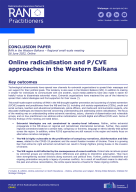Details
- Publication date
- 17 May 2023
- Author
- Directorate-General for Migration and Home Affairs
- RAN Publications Topic
- Internet and radicalisation
Description
Technological advancements have opened new channels for extremist organisations to spread their messages and win support for their political goals. This tendency is also seen in the Western Balkans (WB). In addition to making it simpler for individuals to communicate with one another, social media platforms have also made it easier for hateful voices to disseminate extremist views. Extremist organisations have mastered the use of the internet to spread their radical ideologies and find supporters for their cause.
This small-scale expert workshop of RAN in the WB brought together prevention and countering of violent extremism (P/CVE) experts and practitioners from the WB and the EU, including civil society organisations (CSOs), youth and social workers, teachers and educational professionals, police officers, and media and communication experts, who discussed challenges and lessons learned concerning understanding and addressing online radicalisation. The focus of the meeting was on understanding online extremist narratives, actors, channels of dissemination and vulnerable groups, and on how practitioners can address online radicalisation via both digital and offline P/CVE work.
Some of the key findings of the meeting are listed below.
- Extremist ideologies are not constrained to country-level influence. Rather, online extremist propaganda in the WB draws on regional and (sometimes) international narratives. Further, they exploit regional connections based on a certain hate, conspiracy or extreme, language or ethnic identity that spread across the region. In addition, online P/CVE approaches are still nascent in the region and mainly focus on alternative narrative campaigns.
- The WB is highly vulnerable to the proliferation of conspiracy narratives, disinformation and fake news, related to the COVID-19 pandemic and the recent Russian invasion of Ukraine. There is a growing fear that online far-right extremist recruitment can result in foreign fighters joining Russia in the invasion of Ukraine.
- The WB region is still affected by the consequences of recent conflicts. Online hate narratives spread by extremist groups are reinforcing ethnic differences and adding to interethnic polarisation. They have been strengthening societal divisions along economic and political lines. Further, political instabilities and ongoing polarisation are partly a legacy of previous conflicts. As a result of insufficient means to deal with the past and achieve reconciliation, the online space became a theatre for these ongoing conflicts.
- There is a growing security threat on the rise of ethnonational and far-right extremism, as well as reciprocal radicalisation caused by polarisation, historical revisionism and political narratives. The extremist environment is evolving, and increased attention must be paid to identifying the many extremist narratives that foster interethnic hostility, hate and violence.
- With a profusion of foreign websites spreading information in local languages and significantly increasing their online presence in the WB, international extremist influencers — both Islamist and far-right — from outside the region utilise the internet to reach audiences there. Regionally unique extremist narratives that exploit historical grievances are also being presented on a global scale through the online environment.
- Gender is an important part of extremist narratives. Extremists misuse “traditionalism” and “family” in the online space not only for — more or less — hateful stigmatisation and oppression, but also for the recruitment of men and women.
This paper presents the main highlights of the discussion held online during the meeting and relevant recommendations for successful online P/CVE initiatives.

